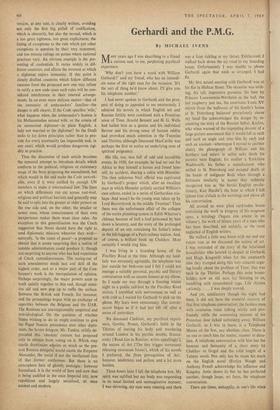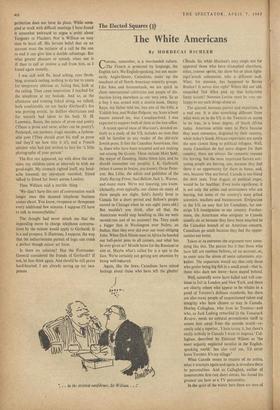Gerhardi and the P.M.G.
By MICHAEL IVENS MANY years ago I was describing to a friend a curious and, to me, perplexing psychical experience.
`Why don't you have a word with William Gerhardi?' said my friend, who has an immedi- ate sense of the right man for the occasion. 'It's the sort of thing he'd know about. I'll give you his telephone number.'
I had never spoken to Gerhardi and the pros- pect of doing so appealed to me enormously. I admired his novels in which English wit and Russian futility were combined with a Proustian sense of Time. Arnold Bennett and H. G. Wells had hailed him as a genius and his individual flavour and his strong sense of human oddity had provoked much attention in the Twenties and Thirties, although Desmond MacCarthy was perhaps the first to notice an underlying note of spiritual poignancy.
His life, too, was full of odd and incredible events. In 1930, for example, he had set out for Africa to buy himself a harem and found him- self, by accident, sharing a cabin with Himmler. The then unknown Nazi official was captivated by Gerhardi's project which, after an excellent start in which Himmler politely carried William's case ashore, ended in a series of Gerhardian mis- haps. And wasn't he the young man taken up by Lord Beaverbrook in the middle Twenties? Then there was the unfortunate affair of the collapse of the entire plumbing system in Edith Wharton's château because of half a loaf jettisoned by him down a lavatory, and the story of the prolonged deposit of an urn containing his father's ashes, in the left-luggage of a Paris railway station. And, of course, a brillant book on Chekhov. Most certainly I would ring him.
I was living in a boarding house off the Finchley Road at the time. Although my land- lady was extremely agreeable, the telephone was just outside her bedroom and I felt I could not manage a suitably personal, psychic and literary conversation with an unseen listener at my elbow. So I made my way through a freezing winter night to a public call-box by the Finchley Road station. I trembled with nervousness as well as with cold as I waited for Gerhardi to pick up the phone. My fears were unnecessary. Our conver- sation began as if it had just left off after a series of yesterdays.
We discussed Chekhov, my psychical experi- ence, Goethe, Proust, Gerhardi's habit in the Thirties of leaving his body and wandering around London in his psychic double, Dostoi- evsky Mead him in Russian; writes appallingly'), the nature of Art (`The tiny trigger movement releasing enormous forces'), which of his novels I preferred, the three prerequisites of Art: humour, tenderness and pathos, and a lot more besides.
Three hours later I left the telephone box. My spirit was uplifted but my body was responding in its usual limited and unimaginative manner; I was shivering, my eyes were running and there was a faint tickling at my throat. Exhilarated, I walked back down the icy road to my boarding house. Unfortunately I was unable to phone Gerhardi again that week as arranged. 1 had flu.
My first actual meeting with Gerhardi was at his flat in Hallam Street. The occasion was strik- ing; his tall, impressive presence, his bust by Princess Loewenstein-Wertheim in the hall, the hot raspberry jam tea, the enormous Louis XV mirror from the ballroom of his family's house at St. Petersburg balanced precariously above my head (he acknowledged the danger by re- counting the story of the Russian fabler, Krylov, who when warned of the impending descent of a large picture announced that it would fall at such and such an angle and miss him by such and such an amount—whereupon I moved to another chair), the photograph of William and his brothers and sisters in sailor suits (both his parents were English; his mother a Yorkshire WadsWorth, his father a manufacturer who settled in St. Petersburg and escaped death at the hands of indignant Reds when through a fortunate similarity in names they suddenly recognised him as 'the heroic English revolu- tionary, Kier Hardie), the hour at which I left (about four o'clock in the morning) and above all his conversation.
All around us were piled card-index boxes containing the work in progress of his inagntini opus, a tetralogy (legato con amore in un volume'), the work of fifteen years of a man who has been described, not unfairly, as the most neglected of English writers.
He walked a little way home with me and our voices rose as we discussed the nature of art. I was reminded of the story of the infuriated householder who howled in despair at Gerhardi and Hugh Kingsmill when for the umpteenth time they tramped along this very crescent argu- ing loudly about the problem of Time; that was back in the Thirties. Perhaps this same house- holder, now an old man, lay listening to us, trembling with remembered rage. Life rhymes curiously. . . . I was deeply moved.
And yet, satisfactory though the night had been, it did not have the essential mptery of that first telephone conversation; the faceless man with courteous voice talking wittily and pro- foundly while the unmeaning minutes of his Proustian time ticked unheeding away. William Gerhardi, as I was to learn, is a Telephone Master of the first, nay absolute, class. There is no one to touch him for matter, manner or dura- tion. A telephone conversation with him has the humour and humanity of a short story by Chekhov or Gogol and the solid length of a Tolstoy novel. Not only has he made his mark on the English novel (Evelyn Waugh and Anthony Powell acknowledge his influence and Kingsley Amis shows it) but he has perfected another, though lesser, art form, the telephone conversation.
There are times, unhappily, in one's life when perfection does not have its place. While occu- pied at work with difficult meetings I have found it somewhat awkward to argue a point about Turgenev or Flaubert. Nor is William an easy man to head off. His fervent belief that on no account must the initiator of a call be the one to end it can give him a double advantage. But what greater pleasure or remedy when one is ill than to call or receive a call from him, as I found again recently.
I was sick with flu, head aching, eyes throb- bing, stomach reeling, nothing to do but to yearn for temporary oblivion or, failing that, look at the ceiling. Then came inspiration. I reached for the telephone at my bedside. And so, as the afternoon and evening ticked along, we talked, both comfortably on our backs (Gerhardi's fire was proving erratic, he dislikes electricians and for warmth had taken to his bed). D. H. Lawrence, Bunin, the nature of prose and poetry (`There is prose and verse; either can be poetry'), Pasternak, our mothers, tragic suicides, a fashion- able poet (`They should print his stuff as prose and they'd see how trite it is'), and a French admirer who had just written to him for 'a little photography of your person.'
The first star appeared, my wife drew the cur- tains, my children came at intervals to wish me good-night. My stomach righted itself, my head- ache lessened, my eye-strain vanished; friend talked to friend for hours across London.
Then William said a terrible thing.
'We shan't have this sort of conversation much longer once this damned telephone business comes about. You know, twopence or threepence every additional few minutes. I suppose I'll have to talk in monosyllables.'
The thought had never struck me that the impending move to charge telephone conversa- tions by the minute would apply to Gerhardi. It is a sad prospect. It illustrates, I suppose, the way that the indiscriminate pursuit of logic can crush a perfect though minor art form.
Is there no solution? Has the Postmaster- General considered the friends of Gerhardi? If not, let him think again. And should he still prove hard-hearted, I am already saving up my two- pences.







































 Previous page
Previous page